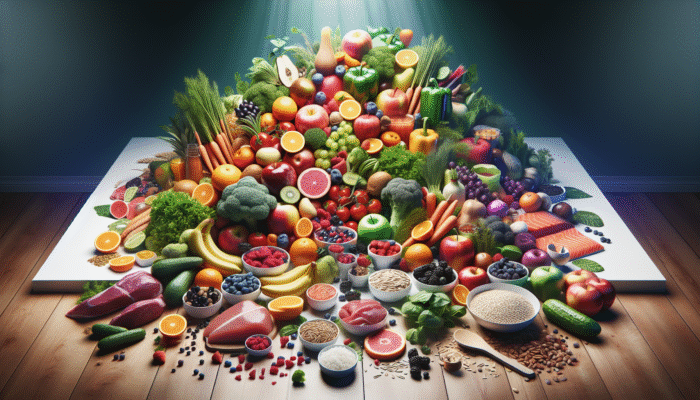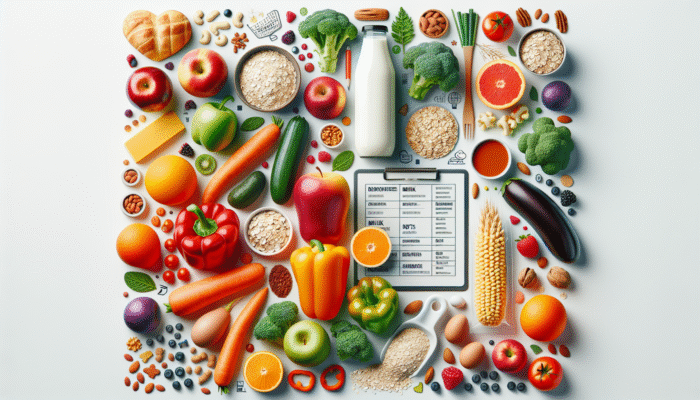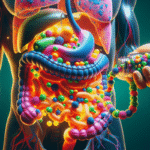Maximising the Advantages of the Dash Diet: Your Comprehensive Heart Health Resource
Exploring the Fundamental Principles of the Dash Diet for Optimal Well-Being

When it comes to preparing meals for a Dash Diet plan, it is essential to recognise that this approach, which stands for Dietary Approaches to Stop Hypertension, primarily aims to decrease sodium consumption while significantly boosting the intake of nutrient-dense foods. This carefully crafted dietary regimen is designed to enhance heart health by encouraging a focus on wholesome ingredients that aid in lowering blood pressure and improving overall well-being. At its foundation, the Dash Diet inspires individuals to adopt a wide variety of fruits, vegetables, whole grains, and lean proteins while markedly reducing salt, added sugars, and red meat.
This dietary model goes beyond transient fads, embodying a long-term dedication to a sustainable and balanced lifestyle. The Dash Diet bolsters the body's vital functions by emphasising foods abundant in potassium, calcium, and magnesium. This balanced strategy not only aids in managing hypertension but also promotes stable energy levels throughout the day. By embracing these principles, individuals embark on a transformative journey towards a healthier lifestyle, resonating across various cultures and dietary preferences, establishing it as a sought-after choice for many around the world.
Uncovering the Comprehensive Health Benefits of the Dash Diet
Extensive research consistently underscores the numerous health benefits linked with the Dash Diet. A standout advantage is its proven effectiveness in lowering blood pressure, making it a vital strategy for those susceptible to hypertension. Numerous studies indicate that individuals adhering to the Dash Diet can witness significant reductions in both systolic and diastolic blood pressure within a matter of weeks of following the recommended guidelines.
In addition to blood pressure management, the Dash Diet plays a crucial role in enhancing heart health by mitigating the risk of cardiovascular diseases. The focus on nutrient-rich foods contributes to lower cholesterol levels and reduced inflammation. Furthermore, this dietary approach aligns well with the prevention of chronic illnesses, including diabetes and certain types of cancer, by promoting a balanced intake of essential vitamins and minerals. By adopting the Dash Diet, individuals worldwide can elevate their overall health while enjoying a diverse array of delicious and satisfying meals.
Essential Components of the Dash Diet for Effective Implementation
To effectively embrace the Dash Diet, it is imperative to grasp its key components. The diet prioritises a broad selection of foods, particularly emphasising fruits and vegetables, which are rich in vitamins, minerals, and fibre. Key whole grains like brown rice, quinoa, and whole-grain bread are fundamental as they provide vital nutrients and support digestive health.
Incorporating low-fat dairy products is essential to deliver necessary calcium and protein without the excess saturated fats commonly found in full-fat options. Lean protein sources, such as fish, poultry, legumes, and nuts, provide essential amino acids that are important for bodily functions. The Dash Diet also advocates for limiting the intake of salt and added sugars, recommending healthier alternatives like fresh herbs and spices. This holistic framework not only promotes heart health but also accommodates a wide variety of tastes and dietary preferences, making it a flexible and inclusive option for individuals from diverse cultural backgrounds.
Practical Strategies for Seamlessly Integrating the Dash Diet into Your Daily Life

Successfully adopting the Dash Diet necessitates careful planning and preparation. Thoughtful meal planning is vital to ensure a well-balanced intake of nutrients while steering clear of processed foods, which are often high in sodium and unhealthy fats. Creating comprehensive shopping lists can streamline your grocery shopping experience, making it easier to select ingredients that are in alignment with the core principles of the Dash Diet.
While dining out may pose challenges, it is entirely feasible to adhere to the principles of the Dash Diet with some strategic foresight. Opt for dishes that showcase fresh vegetables, lean proteins, and whole grains; don’t hesitate to request modifications such as having dressings served on the side or substituting high-sodium sauces. The key to success lies in being conscious and proactive about food choices, ensuring that every meal contributes positively to your goals for heart health and overall wellness.
Crafting Your Tailored Dash Diet Meal Plan
Innovative Weekly Meal Planning Techniques for the Dash Diet
A successful journey on the Dash Diet begins with effective meal planning. To establish a diverse and nutritious eating plan, develop a weekly meal schedule that incorporates a variety of foods in accordance with the diet's foundational principles. Start by pinpointing key ingredients and recipes that highlight fruits, vegetables, whole grains, and lean proteins, ensuring that your meals are both enjoyable and healthful.
Consider infusing international flavours into your meal plan. Dishes such as Mediterranean quinoa salad, Asian-inspired stir-fried vegetables served with brown rice, or zesty Latin bean tacos can bring excitement and variety to your weekly dining experience. Rotating different recipes each week keeps meals engaging and ensures a broader spectrum of nutrients is consumed.
To simplify meal preparation, dedicate one day each week to meal prep. During this time, chop vegetables, marinate proteins, and cook grains in bulk. This proactive approach will facilitate the quick assembly of nutritious meals during busy weekdays, making adherence to the Dash Diet more achievable and enjoyable.
Essential Items to Include on Your Dash Diet Grocery List

Creating a grocery list that aligns with the Dash Diet is crucial for its successful implementation. Begin by prioritising fresh produce, incorporating a vibrant selection of fruits and vegetables. Focus on seasonal items, as they tend to be fresher and more flavourful. Whole grains like oats, quinoa, and whole wheat pasta should form the backbone of your carbohydrate sources.
Include low-fat dairy products such as milk, yoghurt, and cheese, which provide calcium without excessive fat content. Essential lean protein sources encompass chicken breast, fish, legumes, and plant-based proteins like tofu. Nuts and seeds can serve as nutritious snacks, though they should be consumed mindfully due to their higher caloric density.
Avoid aisles filled with processed foods that are high in sodium and sugar while grocery shopping. Instead, concentrate on the perimeter of the store, where fresh ingredients abound. This approach not only supports the Dash Diet but also encourages healthier eating habits overall.
Understanding Portion Control and Serving Sizes Within the Dash Diet
A solid grasp of the concept of portion control is vital for effectively maintaining the Dash Diet. Many individuals underestimate appropriate serving sizes, which can inadvertently lead to overeating, even when consuming nutritious foods. Familiarise yourself with recommended serving sizes, particularly for grains, proteins, and fats, as these components can significantly influence caloric intake.
Utilising measuring tools, such as cups and a kitchen scale, can help solidify correct portion sizes until you develop the ability to visually estimate servings accurately. A well-balanced plate should ideally consist of half filled with vegetables and fruits, one-quarter with whole grains, and one-quarter with lean proteins.
Practising mindful eating can further enhance your overall experience with the Dash Diet. Take the time to savour each bite, eat slowly, and pay attention to your body’s hunger signals. This heightened awareness can help prevent overeating and foster a more positive relationship with food, ultimately paving the way for lasting dietary success.
Cooking Methods That Enhance the Dash Diet Experience
Health-Conscious Cooking Techniques to Elevate Your Dash Diet Dishes
Embracing healthy cooking techniques is essential for anyone following the Dash Diet. Methods such as steaming, baking, and grilling minimise the need for added fats, allowing meals to remain light yet flavourful. For example, steaming vegetables helps to preserve their nutrients while ensuring they remain vibrant and delicious.
Grilling meats and fish imparts a delightful smoky flavour while allowing excess fat to drain away, perfectly aligning with the diet's principles. Baking is another excellent cooking method that can enhance the texture and taste of various foods—consider baked sweet potatoes, which provide natural sweetness without the need for added sugar or butter.
For optimal health, consider incorporating slow cooking into your routine. This method allows flavours to meld beautifully, particularly with beans and hearty vegetables, creating satisfying, nutrient-rich meals. By adopting these cooking techniques, you can prepare delicious dishes that fit seamlessly into a Dash Diet lifestyle.
Smart Strategies for Reducing Sodium in Your Cooking
A fundamental principle of the Dash Diet is to minimise sodium intake. However, reducing salt in your cooking does not necessitate sacrificing flavour; instead, it encourages creativity in seasoning. Fresh herbs such as basil, cilantro, and parsley can introduce vibrant flavours to your dishes without excessive sodium.
Exploring diverse spices is another effective method for enhancing meal flavours. Ingredients like paprika, cumin, garlic powder, and black pepper can significantly elevate the taste of your meals, allowing the natural flavours of the ingredients to shine through. Citrus juices, such as lemon or lime, provide a zesty kick that can often eliminate the need for salt in numerous recipes.
When preparing meals, consider opting for low-sodium alternatives. For instance, choosing low-sodium broth, canned tomatoes, or sauces can drastically reduce your overall sodium intake. Always read labels, as many processed foods can harbour hidden sodium. By being mindful of your seasoning choices, you can enjoy flavourful meals while adhering to the principles of the Dash Diet.
Maximising Nutrient Retention During Cooking
The cooking methods employed can significantly influence nutrient retention in foods, especially vegetables. To align with the Dash Diet’s focus on nutrient-rich foods, aim to cook vegetables lightly. Quick steaming or sautéing preserves essential vitamins and minerals more effectively than prolonged cooking techniques.
For example, broccoli retains a greater nutrient content when lightly steamed rather than boiled. Additionally, consider incorporating raw vegetables into your meals, such as in salads or crudité platters, which contribute a crunchy, refreshing element while maximising nutrient intake.
Another effective strategy is to use the cooking water from steamed vegetables to enhance soups or sauces, ensuring that any leached nutrients are not wasted. This holistic cooking approach supports the Dash Diet while encouraging sustainable kitchen practices, allowing you to make the most of your ingredients.
Integrating Whole Grains into Your Dash Diet Recipes
Whole grains represent a cornerstone of the Dash Diet and offer numerous health benefits, including increased fibre intake, which aids digestion and promotes feelings of fullness. Incorporating whole grains such as quinoa, barley, and farro into your recipes can enhance both the nutritional value and flavour profiles of your meals.
For breakfast, consider whole-grain oats topped with fresh fruit and nuts, establishing a balanced start to your day. A hearty grain bowl featuring brown rice, beans, and a medley of vegetables for lunch delivers a satisfying and nutritious meal.
Dinner can also embrace whole grains; try serving grilled chicken alongside quinoa and steamed broccoli, or prepare a vegetable stir-fry with brown rice. This versatility allows for innovative culinary exploration while adhering to the Dash Diet, making it easier to achieve your dietary objectives without feeling deprived.
Selecting Lean Proteins That Align with the Dash Diet
Choosing lean proteins is essential for those following the Dash Diet. Options such as fish, poultry, beans, and legumes are lower in fat and rich in essential nutrients, providing a heart-healthy alternative to red meats. Fish, particularly fatty varieties like salmon and mackerel, serve as excellent sources of omega-3 fatty acids, renowned for their cardiovascular health benefits.
Chicken breast and turkey are versatile lean meats that can be prepared in various ways, from grilling to baking, ensuring they remain moist and flavourful without excessive fat. Plant-based proteins such as lentils and chickpeas are also outstanding options, delivering substantial nutrients while being cost-effective and environmentally friendly.
Incorporating diverse protein sources into your meals can help prevent monotony while ensuring you meet your nutritional requirements. For instance, enjoy a hearty lentil soup brimming with vegetables for a fulfilling dinner or a grilled salmon salad for a light lunch. By focusing on lean protein choices, you can create satisfying meals that adhere to the Dash Diet principles.
Invigorating Dash Diet Breakfast Ideas to Start Your Day Right
Wholesome Breakfast Recipes That Energise Your Mornings
Embarking on your day with a Dash Diet-friendly breakfast can set a positive tone for healthier choices throughout the day. One delightful option is oatmeal topped with fresh fruits and a sprinkle of nuts. This hearty meal provides fibre and essential nutrients that energise you for the day ahead.
Smoothies represent another excellent breakfast choice, brimming with nutrients. Blend low-fat yoghurt with an assortment of leafy greens, such as spinach or kale, combined with your favourite fruits for a refreshing drink. Adding protein-rich yoghurt enhances its satiating quality, while the green vegetables contribute vital vitamins and minerals.
For those who prefer savoury breakfasts, consider an egg scramble with diced bell peppers, onions, and tomatoes, served on whole-grain toast. This protein-rich breakfast fuels your body while adhering to the Dash Diet. By exploring a variety of nutritious breakfast recipes, you can kickstart your day with energy and satisfaction.
Quick and Convenient Breakfast Options for Busy Mornings
Time constraints shouldn’t deter your commitment to the Dash Diet. Quick and easy breakfast options can be both satisfying and nutritious. Whole-grain toast topped with smashed avocado and a poached egg is a straightforward yet flavourful choice that combines healthy fats and protein.
Greek yoghurt with berries and a sprinkle of granola presents another swift breakfast option. This combination offers a creamy texture alongside the freshness of fruit, with the granola adding a delightful crunch. Opt for a low-sugar granola variety to keep your breakfast in line with dietary guidelines.
Overnight oats represent an ideal make-ahead option that allows for creative flavour combinations. Mix rolled oats with low-fat milk or yoghurt and your preferred toppings, such as nuts or fruit, and let it sit in the refrigerator overnight. This way, you’ll have a satisfying breakfast ready in the morning, perfectly aligned with the Dash Diet.
Incorporating Whole Grains into Your Breakfast Routine
Integrating whole grains into your breakfast is a fundamental aspect of the Dash Diet. Whole grain cereals, breads, and muffins provide essential fibre and contribute to sustained energy levels. Choose cereals that list whole grains as the first ingredient to ensure you select the most nutrient-dense options available.
Whole-grain pancakes made with oat or whole wheat flour can serve as a delightful breakfast treat. For a healthier alternative to traditional toppings, serve them with fresh fruit or a light drizzle of pure maple syrup. This satisfies sweet cravings while supporting your dietary objectives.
Another innovative way to incorporate whole grains is through breakfast bowls, combining cooked quinoa or brown rice with sautéed vegetables and a poached egg. This unconventional yet nutritious option keeps breakfast exciting while ensuring you meet the Dash Diet’s recommendations.
Low-Sodium Breakfast Options for a Healthy Start
Breakfast doesn’t have to be bland to adhere to low-sodium guidelines. Opt for low-sodium choices like unsalted nuts and fresh fruit for a quick and nutritious meal. Nuts not only provide healthy fats but also offer protein and fibre, making them a satisfying snack.
Homemade granola is a fantastic method to manage sodium levels while enjoying a breakfast favourite. Prepare granola using rolled oats, nuts, seeds, and a hint of honey for sweetness, ensuring no added salt. Enjoy it with low-fat dairy or a plant-based alternative for a delightful breakfast experience.
Smoothies can also be tailored to fit low-sodium guidelines. Create a blend of low-sodium vegetable juice, spinach, and your preferred fruits for a refreshing morning drink. This approach guarantees a nutrient-packed start to your day without compromising on flavour, aligning perfectly with the Dash Diet.
Delicious Lunch and Dinner Recipes for the Dash Diet
Heart-Healthy Lunch Ideas to Keep You Energised All Day
Lunch can be both appetising and nutritious while adhering to the Dash Diet. One heart-healthy option is a salad featuring grilled chicken, mixed greens, and a colourful assortment of vegetables dressed in a light vinaigrette. Incorporating a variety of produce not only elevates the meal's visual appeal but also maximises nutrient diversity.
Another fulfilling lunch idea is a whole-grain wrap filled with lean turkey, fresh spinach, sliced tomatoes, and avocado. A whole-grain wrap adds fibre and keeps you feeling satiated longer. Pairing this with raw vegetables or fruit creates a well-rounded meal rich in essential vitamins and minerals.
For a more substantial option, consider a quinoa bowl topped with roasted vegetables and chickpeas. This hearty dish is packed with protein and fibre, making it ideal for those looking to sustain energy levels throughout the afternoon. Exploring heart-healthy lunch ideas can keep your meals exciting while remaining aligned with the Dash Diet.
Satisfying Dinner Options That Align with the Dash Diet
Dinner presents an opportunity to create satisfying meals that resonate with the Dash Diet principles. A baked salmon dish, paired with quinoa and steamed broccoli, is simple to prepare yet rich in omega-3 fatty acids and essential nutrients. The combination of flavours and textures makes for a delightful dining experience.
Another excellent option is a stir-fry featuring vibrant vegetables such as bell peppers, broccoli, and snap peas, tossed with lean chicken or tofu. Serve this over brown rice or quinoa for a complete, colourful, nutrient-dense meal. Experimenting with various sauces, such as low-sodium soy sauce or a homemade teriyaki glaze, can elevate the dish while keeping it within dietary guidelines.
For vegetarian options, consider a hearty lentil stew simmered with tomatoes, carrots, and celery. This filling meal is rich in protein and fibre, making it a superb choice for anyone looking to meet their nutritional needs. Exploring various satisfying dinner options allows you to relish diverse flavours while adhering to the Dash Diet.
Delectable Vegetarian Meals That Fit Within the Dash Diet
Vegetarian meals can be immensely satisfying while following the Dash Diet. A lentil soup, rich in protein and fibre, offers a comforting dinner option. Combine lentils with diced vegetables and spices for a hearty meal that can be prepared in advance and enjoyed throughout the week.
Consider crafting a chickpea salad that includes cucumber, tomatoes, red onion, lemon juice, and fresh herbs. This refreshing dish provides essential nutrients and bursts with flavours that keep meals interesting. Pair it with whole-grain bread for added fibre.
Another delightful vegetarian option is stuffed bell peppers, filled with quinoa, black beans, and diced vegetables. This colourful dish can be baked to perfection, offering a satisfying meal with various textures. You can align with the Dash Diet by incorporating a range of vegetarian meals while enjoying delicious and nutritious food.
Nourishing Snacks and Desserts That Complement the Dash Diet
Wholesome Snack Options to Sustain Your Energy Levels
Healthy snacking is a fundamental aspect of the Dash Diet, assisting you in maintaining energy levels between meals. Fresh raw vegetables paired with hummus create a crunchy and satisfying snack filled with fibre and healthy fats. Carrot sticks, bell peppers, and celery are all excellent choices for dipping.
Fruits also make wonderful snack options, delivering natural sweetness without added sugars. Slices of apple with almond butter or a handful of berries provide both nutrition and satisfaction. Nuts can serve as an energy-boosting snack, but due to their higher caloric content, it’s crucial to be mindful of portion sizes.
For those seeking a more filling snack, consider whole grain crackers topped with low-fat cheese. This combination delivers a healthy balance of carbohydrates and protein, making it perfect for curbing hunger. By focusing on healthy snack choices, you can stay on track with the Dash Diet while enjoying a variety of delicious flavours.
Your Questions Clarified: Understanding the Dash Diet
What is the Dash Diet all about?
The Dash Diet, or Dietary Approaches to Stop Hypertension, focuses on reducing sodium intake while boosting the consumption of fruits, vegetables, whole grains, and lean proteins to promote overall heart health.
How can the Dash Diet assist in blood pressure management?
The Dash Diet centres on nutrient-rich foods that help lower blood pressure by decreasing sodium intake and increasing potassium, calcium, and magnesium consumption, leading to improved heart health.
Is consuming meat permissible while following the Dash Diet?
Yes, the Dash Diet allows for lean meats in moderation. To adhere to the diet effectively, focus on poultry, fish, and plant-based proteins while limiting red and processed meats.
Are there specific foods to avoid on the Dash Diet?
The Dash Diet encourages minimising salt, added sugars, processed foods, high-fat dairy, and red meat. Prioritising whole, fresh foods is crucial for achieving success.
How should I prepare my meals for the Dash Diet?
Meal prepping involves planning and preparing meals in advance. To simplify meal preparation throughout the week, focus on batch cooking whole grains, chopping vegetables, and marinating proteins.
Is the Dash Diet suitable for vegetarians?
Absolutely! The Dash Diet can easily accommodate a vegetarian lifestyle by emphasising plant-based proteins, whole grains, fruits, and vegetables.
Are snacks allowed on the Dash Diet?
Yes, healthy snacks are encouraged on the Dash Diet. To maintain satisfaction between meals, choose raw vegetables, fruits, nuts, and whole grain options.
How can I ensure I'm consuming the correct portion sizes on the Dash Diet?
Understanding portion sizes involves familiarising yourself with recommended servings, using measuring tools, and practising mindful eating to ensure balance and moderation in your meals.
What are some quick breakfast ideas for the Dash Diet?
Quick breakfast options include overnight oats, whole-grain toast topped with avocado, and Greek yoghurt with berries. These meals are nutritious and easy to prepare, perfect for busy mornings.
Can I still enjoy dining out while on the Dash Diet?
Yes, you can enjoy dining out while following the Dash Diet. Focus on selecting dishes that include fresh vegetables, lean proteins, and whole grains, and don't hesitate to request modifications to fit your dietary needs.
Connect with us on Facebook for the latest updates!
The post How to Cook for a Dash Diet Plan: A Universal Guide appeared first on https://cookinggods.com
The Article Dash Diet Plan: Your Ultimate Cooking Guide Was Found On https://limitsofstrategy.com

The Dash Diet’s emphasis on nutrient-dense foods truly resonates with me, especially in a world where convenience often trumps health. I’ve found that incorporating more fruits and vegetables into my meals not only enhances flavor but also enriches my overall well-being. It’s interesting to see how a focus on reducing sodium can lead to broader shifts in dietary habits. For instance, I’ve started experimenting with herbs and spices as alternatives to salt, which has transformed my cooking and added new dimensions to my meals.